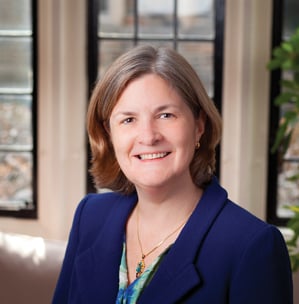After decades of academic work and research in the world’s most established medical-research region, New England, Nancy Andrews relocated to an emerging medical center: North Carolina’s Research Triangle Park, where she serves as dean of the Duke University School of Medicine and vice chancellor of academic affairs.

Andrews oversees a school of more than 2,000 faculty, scientists, clinicians, and instructors, plus nearly 2,000 learners. Duke’s medical school receives more than $700 million annually in research funds and was ranked eighth in the 2016 U.S. News and World Report listing of top research-focused medical schools.
“We’re younger than most peer medical schools,” she says. “There’s a lot of energy in this area. And we definitely still have a lot of room to grow.”
Andrews joined Duke in 2007 after a long professional affiliation with Harvard Medical School, where she was dean for basic sciences and a faculty member at Children’s Hospital Boston and the Dana-Farber Cancer Institute. She received her MIT PhD in biology/life science as an MD-PhD student, earning her MD from Harvard in 1987.
“The people I met at MIT are still a big part of my scientific network,” she says. “And being part of a very creative, entrepreneurial environment was great. I was exposed to scientists looking at problems in very different ways.”
Andrews stayed connected to MIT by serving as director of the Harvard-MIT MD-PhD program from 1999 to 2003. “The joint program is a unique experience,” she says. “Harvard has great resources for science and medical applications. And I was also able to experience the culture at MIT—which is quite different—and have access to all of the wonderful labs in the Schools of Science and Engineering.”
During her affiliation with Harvard, Andrews’s time was often split between her research laboratory and hospital work. “Medicine and science complement each other well,” she says. “And they’re both focused on solving problems. But my work has always weighed more toward research and less toward hands-on clinical care.”
Andrews grew up in Syracuse, New York, and earned her bachelor’s degree and a master’s degree in molecular biophysics and biochemistry from Yale University. She lives in Chapel Hill with her husband, biologist Bernard Mathey-Prevot. They have two children, Camille and Nicolas.
Keep Reading
Most Popular
Large language models can do jaw-dropping things. But nobody knows exactly why.
And that's a problem. Figuring it out is one of the biggest scientific puzzles of our time and a crucial step towards controlling more powerful future models.
How scientists traced a mysterious covid case back to six toilets
When wastewater surveillance turns into a hunt for a single infected individual, the ethics get tricky.
The problem with plug-in hybrids? Their drivers.
Plug-in hybrids are often sold as a transition to EVs, but new data from Europe shows we’re still underestimating the emissions they produce.
Google DeepMind’s new generative model makes Super Mario–like games from scratch
Genie learns how to control games by watching hours and hours of video. It could help train next-gen robots too.
Stay connected
Get the latest updates from
MIT Technology Review
Discover special offers, top stories, upcoming events, and more.